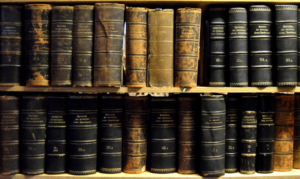
One of my (many) reasons for applying to the Narrative Futures programme was my ever-growing frustration with the stagnation of the publishing industry. While all around us, art explores new avenues, new mediums, new technologies, constantly creeping from the too-narrow or too-vague definitions that we try to contain it with, writing is just… writing. It’s words on a page, solely dependent on the writer’s ability to transform their ideas into words, and the reader’s ability to re-transform said words into ideas of their own.
I love books. I do. A good third of my possessions, currently in storage in another country, is books. I don’t want to abolish books, or claim that nobody even reads anymore, or decry the concept as outdated and stuffy. But I do think the traditionalist approach that writing consists of words on paper is stifling us as a community, and continually widening the gap of what we do and what we could be doing, if we only dared.
Compare the publishing industry to other creative fields – visual arts, the games industry, film – and the lack of advancement we’ve made in recent decades becomes staggering. Even today, almost a quarter into the 21st century, we continue to debate the merits of e-books and audiobooks, as if nothing but printed words on the paper page could ever be considered true literature. Technological advances are offered at times, but they are rarely more than fads; here most notably my experience at the Frankfurt Book Fair in 2017, wandering from one VR experience to the next – all of which were ambitious projects intended to explore the virtualibility of writing, none of which returned a second year. One of the books in my many, many storage boxes includes an AR app that allows you to scan certain pages and view visualizations of the text, or have illustrations change from one image to another – an idea so good that it makes me a little angry I didn’t think of it myself if only the app had worked properly.
The ideas are there. Change is possible. So why isn’t it happening? My hope in attending this programme is, in part, to break past those preconceived notions of what is – and isn’t – writing. To ease it out of the stifling grasp of tradition and explore writing in all its facets, without attempting to turn it into something it’s not.
I don’t know how that can happen, precisely because I lack the knowledge of what technological tools are at our disposal to actually make those changes. I’m limited by my lack of knowledge in anything but the most traditional of publishing paths. In participating in Narratives Futures and the EFI, I hope to explore, wildly, the possibilities, limits, and facets of writing. I want to dig into the grey areas of what is and isn’t writing at the same time. I want to expand the horizons of what I’ve been told writing could be, to take it past those predefined, stifling boundaries and ask the question of what writing can be.



Leave a Reply